The study “The Role, Activities and Contributions of Female Elected Representatives in Vietnam during the period 2016-2021” was jointly conducted by the University of Social Sciences and Humanities - Vietnam National University, Hanoi, the United Nations Development Programme (UNDP) in Vietnam, the Committee on Representative Affairs under the Standing Committee of the National Assembly, and related agencies; with co-funding from the Australian Department of Foreign Affairs and Trade (DFAT), the Embassy of Ireland in Vietnam, and UNDP.
The study conducted a questionnaire survey with 248 National Assembly deputies of the 14th term (50% of the National Assembly deputies) and 136 provincial People's Council deputies from three provinces and centrally-administered cities: Hanoi, Binh Phuoc, and Can Tho. The two objectives were: to assess the role, activities, and contributions of female National Assembly deputies of the 14th term and female provincial People's Council deputies for the 2016-2021 term; and to propose some policy and practical recommendations towards gender equality in elected bodies in Vietnam for the period 2021-2026 and towards 2030.
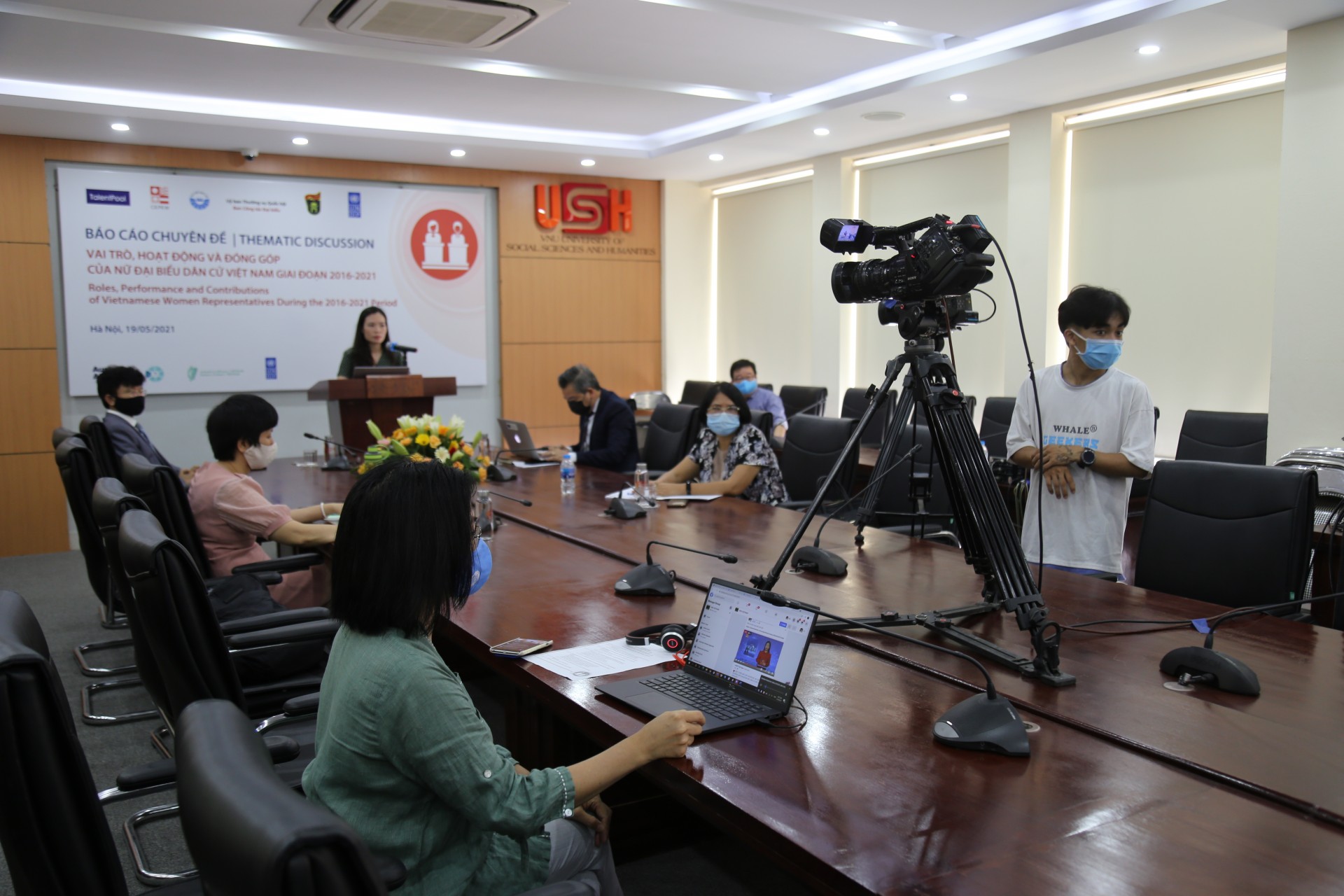
In her opening remarks, Ms. Diana Torrres (UNDP Representative in Vietnam) shared the perspective of Ms. Elisa Cavacece (Deputy Ambassador and Development Counsellor, Embassy of Ireland in Vietnam): The leadership role of women in the public sector is truly significant because it is essential to ensure that women's perspectives and voices are integrated into the entire policy-making process. Every public policy needs to fully reflect the views of both women and men to ensure equality and fairness.

Diana Torres delivered the opening remarks.
In Vietnam, the percentage of female candidates on the official list of candidates for the 15th National Assembly has reached 45.28%, an increase of 6.51% compared to the 14th National Assembly. However, the percentage of female candidates at the central level and policy-making level is only 22.43%. Meanwhile, Resolution No. 26-NQ/TW of the 7th Central Committee (12th Congress) sets a goal of having female cadres in the structure of the Standing Committee of Party Committees and Party organizations at all levels by 2030 (20-25% of Party Committee members should be women; National Assembly deputies should also be women). This requires policy measures to increase the participation of women in important positions in the state apparatus.
The study "The Role, Activities, and Contributions of Female Elected Representatives in Vietnam from 2016-2021" is an effort to provide data and evidence as a basis and argument for policymakers to promote greater women's participation in politics.
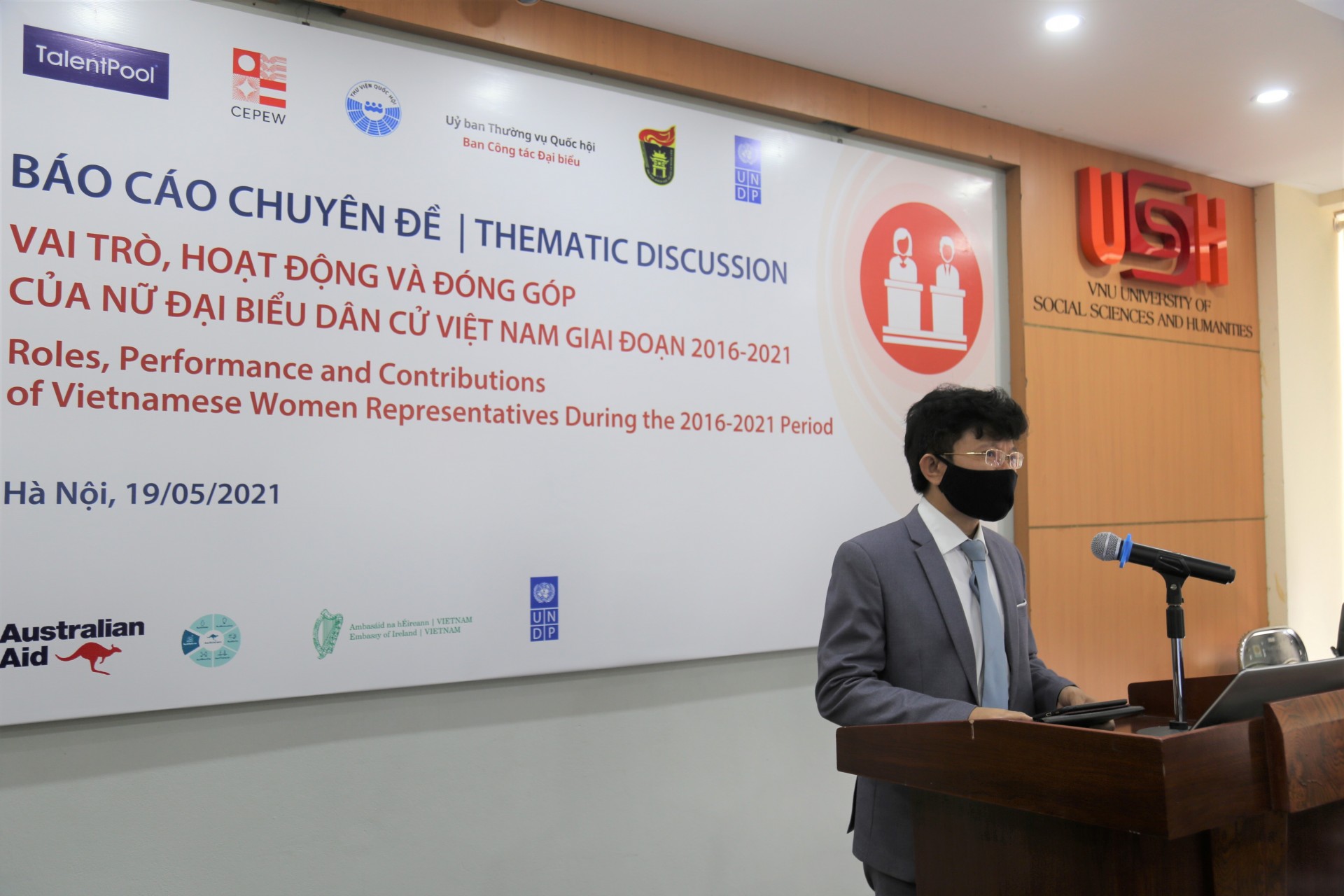
Professor Hoang Anh Tuan (Rector of the University of Social Sciences and Humanities) delivered the opening speech.
On behalf of the University of Social Sciences and Humanities, Professor Hoang Anh Tuan (Rector of the University of Social Sciences and Humanities) emphasized the significance of the research presentation at a time when the 15th National Assembly elections and the elections for People's Councils at all levels for the 2021-2026 term are about to take place. He expressed confidence that the research results and the discussions would attract significant public attention. Professor Hoang Anh Tuan expressed his belief that the research findings would be a useful source of reference data for state agencies in formulating policies on gender equality in politics. Taking this opportunity, the Rector also thanked UNDP and domestic and international partners for their support of this research program. He hoped that in the future, the University of Social Sciences and Humanities would continue to collaborate with relevant organizations and agencies to conduct similar research.
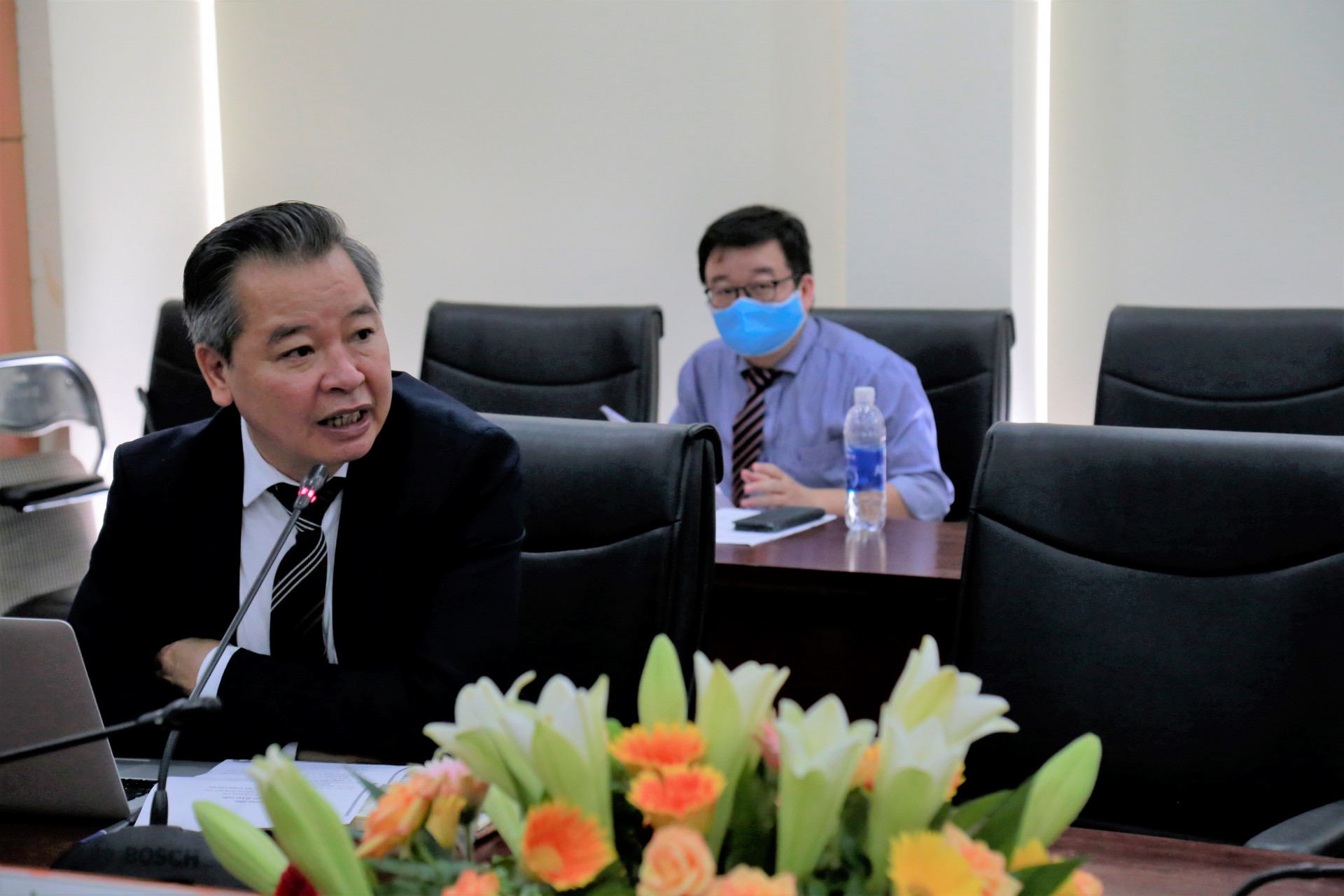
Prof. Dr. Pham Quang Minh (Former Rector of the University of Social Sciences and Humanities) Introduction to the report
Following the opening remarks, Professor Pham Quang Minh (former Rector of the University of Social Sciences and Humanities) and Associate Professor Nguyen Tuan Anh (Deputy Head of the Sociology Department) presented a summary of the research findings on "The Role, Activities, and Contributions of Female Elected Representatives in Vietnam during the period 2016-2021".
The results show that, despite having interests and strengths in different areas, both male and female elected representatives are concerned with the interests of their constituents, considering them the most important factor in fulfilling their duties.
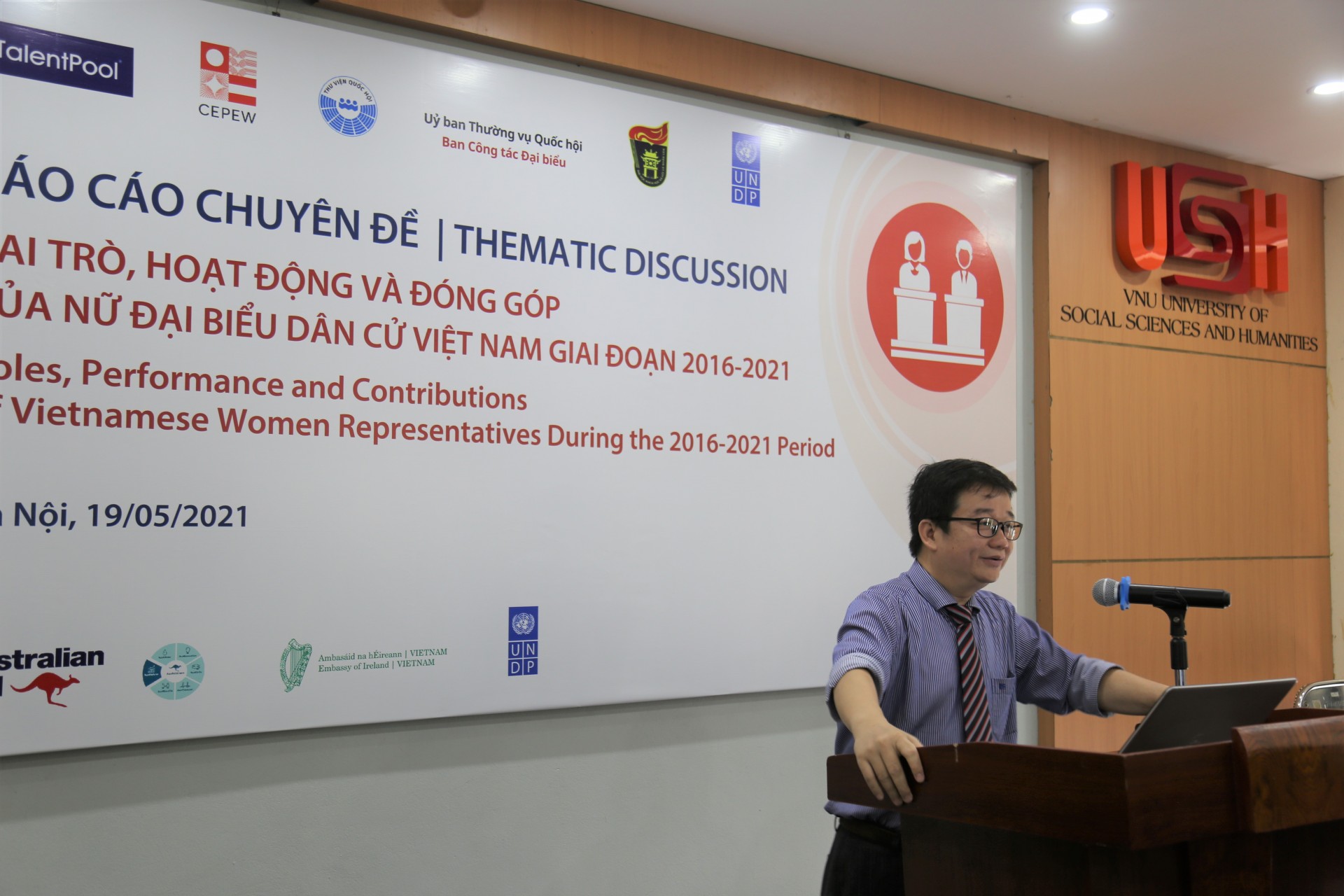
Assoc. Prof. Dr. Nguyen Tuan Anh (Deputy Head of the Department of Sociology) presented the report.
Female National Assembly and People's Council representatives tend to be more proactive in utilizing social media to communicate and interact with constituents compared to their male counterparts. Both male and female National Assembly and People's Council representatives affirm that they meet the needs of constituents in addressing petitions and requests at a high level. Both male and female National Assembly representatives assess their strongest area of expertise as legislative. Similarly, both male and female provincial People's Council representatives consider oversight activities to be their greatest strength.
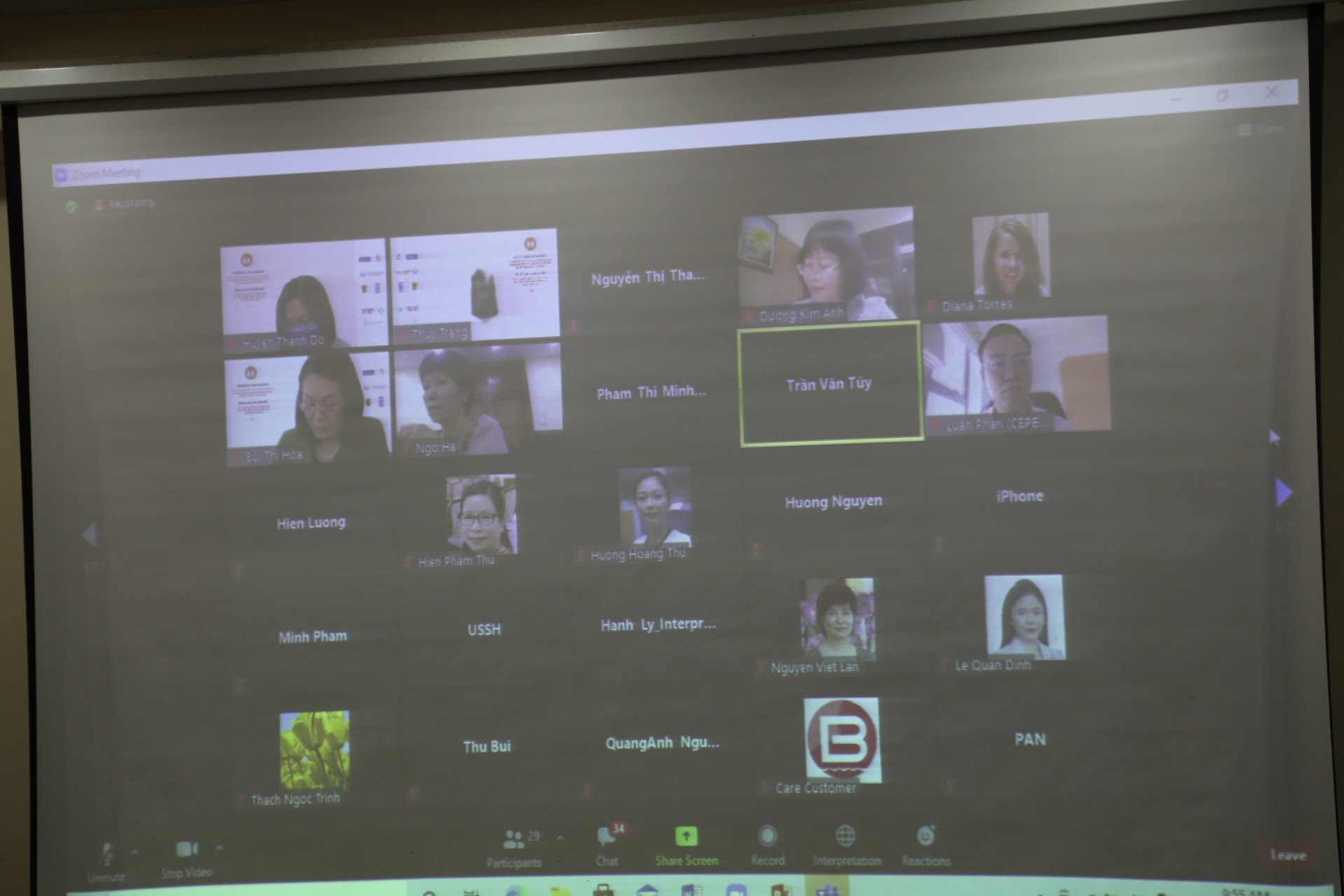
The discussion was held online via Zoom software.
The study recommends specific policies and roadmaps to promote the implementation of Resolution No. 26-NQ/TW of the 7th Central Committee (12th Congress). To achieve this goal, the report proposes that Vietnam should set a target of 45% or more of each gender in the list of candidates, especially since the percentage of women in the official list of candidates for the 15th National Assembly has already reached 45.28%. Furthermore, it is necessary to create conditions for capable and qualified women to self-nominate in order to enhance the quality of female candidates.
After listening to the research report, the audience proceeded to two discussion sessions:
Session 1: The role, activities, and contributions of female National Assembly deputies of the 14th term.
Session 2: The role, activities, and contributions of female representatives in the People's Council during the 2016-2021 term.
Author:Tran Minh
Newer news
Older news